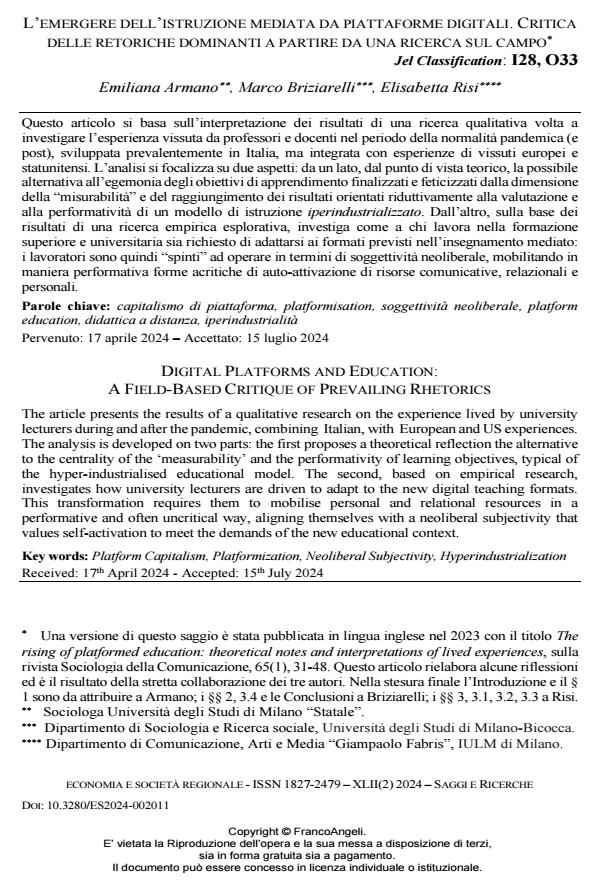L’emergere dell’istruzione mediata da piattaforme digitali. Critica Delle retoriche dominanti a partire da una ricerca sul campo
Titolo Rivista ECONOMIA E SOCIETÀ REGIONALE
Autori/Curatori Emiliana Armano, Marco Briziarelli, Elisabetta Risi
Anno di pubblicazione 2024 Fascicolo 2024/2
Lingua Italiano Numero pagine 20 P. 143-162 Dimensione file 352 KB
DOI 10.3280/ES2024-002011
Il DOI è il codice a barre della proprietà intellettuale: per saperne di più
clicca qui
Qui sotto puoi vedere in anteprima la prima pagina di questo articolo.
Se questo articolo ti interessa, lo puoi acquistare (e scaricare in formato pdf) seguendo le facili indicazioni per acquistare il download credit. Acquista Download Credits per scaricare questo Articolo in formato PDF

FrancoAngeli è membro della Publishers International Linking Association, Inc (PILA), associazione indipendente e non profit per facilitare (attraverso i servizi tecnologici implementati da CrossRef.org) l’accesso degli studiosi ai contenuti digitali nelle pubblicazioni professionali e scientifiche.
Questo articolo si basa sull’interpretazione dei risultati di una ricerca qualitativa volta a investigare l’esperienza vissuta da professori e docenti nel periodo della normalità pandemica (e post), sviluppata prevalentemente in Italia, ma integrata con esperienze di vissuti europei e statunitensi. L’analisi si focalizza su due aspetti: da un lato, dal punto di vista teorico, la possibile alternativa all’egemonia degli obiettivi di apprendimento finalizzati e feticizzati dalla dimensione della “misurabilità” e del raggiungimento dei risultati orientati riduttivamente alla valutazione e alla performatività di un modello di istruzione iperindustrializzato. Dall’altro, sulla base dei risultati di una ricerca empirica esplorativa, investiga come a chi lavora nella formazione superiore e universitaria sia richiesto di adattarsi ai formati previsti nell’insegnamento mediato: i lavoratori sono quindi “spinti” ad operare in termini di soggettività neoliberale, mobilitando in maniera performativa forme acritiche di auto-attivazione di risorse comunicative, relazionali e personali.
Parole chiave:capitalismo di piattaforma, platformisation, soggettività neoliberale, platform education, didattica a distanza, iperindustrialità
Jel codes:I28, O33
Emiliana Armano, Marco Briziarelli, Elisabetta Risi, L’emergere dell’istruzione mediata da piattaforme digitali. Critica Delle retoriche dominanti a partire da una ricerca sul campo in "ECONOMIA E SOCIETÀ REGIONALE " 2/2024, pp 143-162, DOI: 10.3280/ES2024-002011